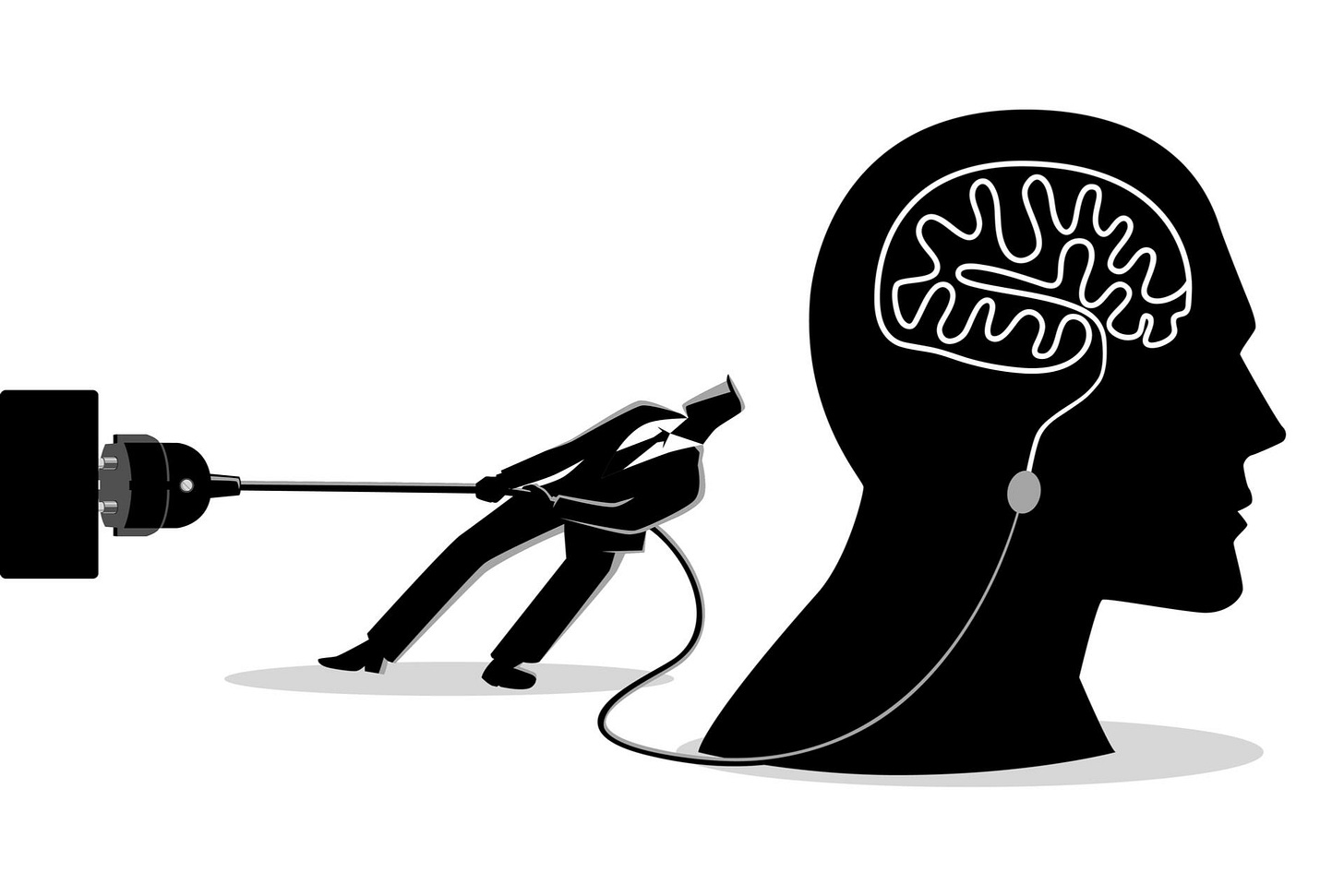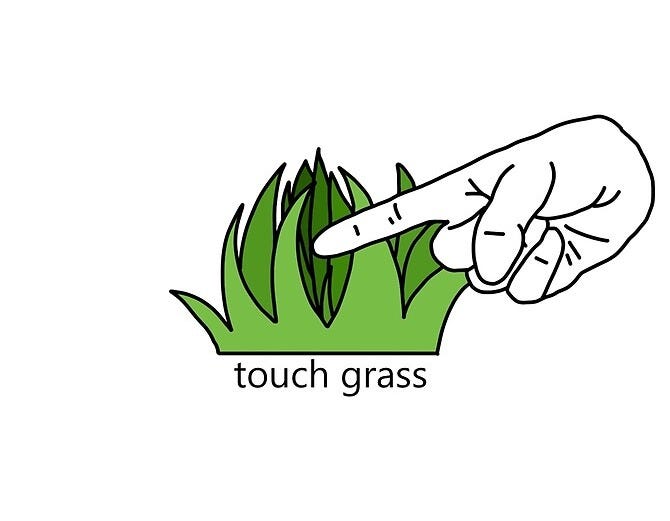Getting Offline and Touching Grass: How Do We Encourage Others to See the World Differently?
What if the key to creating a more resilient, less fearful society was to reduce our time online and cultivate a life offline?

“What you consume, you become:
The books you read.
The content you watch.
The people you spend time with.
The thoughts you feed your mind.
Choose wisely.”
-Note from
The world currently feels upside down for many of us. The inherent structure of our media landscape overwhelmingly selects for content that is disturbing, violent, and sensational. This transfers over to creating a mental model of “how things are” and to perceiving our world in bleak, cynical, and misanthropic terms. This can then further morph into ugly sentiments and behaviors of explicit forms of violence, tribalism, xenophobia, fear, and prejudice. We’re experimenting with a rather unusual and grim feedback loop of filtering news about the world: the more information we receive about the world being a dangerous and ugly place, the more we will perceive it that way and act accordingly.
In researching my forthcoming book on the role media plays in promoting an alarmist worldview, I had an eerie thought: what if our world were to fall apart due more to mass confusion, hysteria, and panic rather than genuine threats? That we had been duped by bad information all along and scared ourselves into preemptively destroying everything we held dear? The ultimate tragedy is if civilization were to eventually panic and fall into chaos and anarchy as a result of misperceived threats and confusion, while, objectively, everything was quite mild by historical comparisons. Is this the path we’re headed down as we linger evermore online, getting our information about the world in such a disjointed and unverifiable manner?
The madness of crowds should never be underestimated. Believing the world to be inevitably doomed is a grave mistake and could lead us to a self-fulfilling prophecy if the majority of us who hold such beliefs decide to act on them in irreparably dangerous ways: becoming more passive, enabling further legislation to pass that is more draconian, keeping children under greater surveillance, ceding power and authority to those who promise to keep us safe, and cutting ourselves off from otherwise remarkable experiences because we are too afraid to venture out anymore.
Instead of venturing out into the world to see what is really happening “out there”, our era of social media has been reverting us all to being armchair social critics railing against anonymous people online. We seem so confident that we’re getting all the data we need from our televisions and internet sources to be informed, all the while we’re unwittingly cutting ourselves off from raw data out in the world of experience. Little do we realize how our online information is highly susceptible to corruption and manipulation.
Since we get most of our information indirectly from the internet and television, we suffer from a severe deficit in firsthand experiences and consequently construct alternative realities in our minds based on increasingly more dubious and unverifiable sources. We should be more skeptical and cautious about the narratives we hear about the world and other people when we’re not observing events firsthand. Sadly, we are not so diligent and are imperiled by our credulity.
While there are seemingly endless horrific and devastating events happening around the globe all the time—and I am not arguing for complacency or indifference—I remain convinced things “out there” across our immense planet are better than we’re imagining them. What is morally imperative for us all to figure out is how we get more of us to broaden and balance our perspectives: by becoming more directly engaged offline rather than passively engaged online.
To cut to the chase, I think we all need some time away from being online all the time if we’re going to have any hope of recalibrating our brains and constructing a more prosperous and resilient global society in the long run. But how do we get others to see the value in seeing the world differently when we are incredibly enamored with these new technologies and ways of communicating? How do we get more of us engaged and passionate about wandering out our doors to experience the world beyond bickering computer and television screens and immerse ourselves in more direct experiences that tend to hone our perspective-taking skills, e.g., community involvement, being in nature, visiting other countries and cultures?
What I think most of us fail to appreciate is that the internet is currently compromised, perhaps irreparably so. There is undoubtedly great stuff here, but there’s also too much nonsense and noise in the machine and not enough time for most of us to figure out how to properly decipher what is real and what isn’t. Artificial intelligence is making mush of our minds. The internet has become an elaborate warehouse of funhouse mirrors that are constantly distorting our sense of reality. It isn’t that the world is a worse place than usual, necessarily. It’s that the information we’re being fed isn’t random or necessarily informative or educational, but highly curated by algorithms that are selected purely for amusement, entertainment, and outrage. There is real concern on the horizon that our minds and social skills are atrophying as we outsource our time, attention, and critical thinking to machines.
More of us are catching on to this depressing realization that the internet, and more explicitly, social media outlets, are a kind of circus and theatre where we come to throw rotten fruit at one another, laugh at someone who is in pain, or dig up dirt on someone to mock and embarrass them because they aren’t in our political or cultural tribe. Somehow, we’ve convinced ourselves that these behaviors are normal. The internet has thus revealed a dark, ugly, and regretful side to our nature.
We’re feeding a machine of insanity and creating a species of reactionaries stewing in a culture of endless grievance. That’s why I’m so adamant about encouraging others to get offline, read books, go outside to relish the sun on our face, build something with our hands, engage with our neighbors and community, and see the real world. With each passing year, I wonder if this year will be the one where we wisen up and collectively mature out of this dystopic larval stage we’re still in. Yet, tomorrow never comes.
I’m increasingly convinced that life would improve if we abandoned the internet and the rest of the digital world, for I fear that our exposure to too much television and social media has hijacked our brains and radically disoriented our perception of reality. However, simply suggesting that people get offline more and do these things seems to be an impossible, perhaps even delusional request. I wish it were as simple as telling people to kill their televisions, unplug from the internet, and go touch grass. However, this is our culture…for the time being at least. But one can hope.
Nevertheless, we do have the power to make better, incremental choices and perhaps give our time and attention to more fruitful habits. It can feel that if we’re not online, we’re ignoring the world; that we’re not staying abreast of cultural and political life, and that we’re burying our heads in the sand and not wanting to be informed. But that’s not what we’re doing when we take a hiatus from being plugged into the machine. By getting offline, we’re taking time to restore something vital and central to repairing all other levels of society: our sanity.
Just consider how perturbed nearly everyone around us seems to be these days. Is there not something we can be doing to ease our worries and frustrations? After all, what good are we to anyone if we’re constantly anxious, enraged, or depressed by a world that is all too consumed by politics and culture wars? Does this have to be the focal point of every conversation we have with one another? We’re gradually fine-tuning our minds to being a more miserable person to both be and be around. And the thing is, most people probably won’t tell us this. They’ll steadily stop inviting us to parties and coldly fall out of our lives, and we’ll be none the wiser.
I suspect this is what is happening on a far grander scale in our society than we realize. As any anthropologist will say, humans are social creatures. This means our well-being is dependent on being firmly embedded in a social web of relationships of kith and kin. When this web begins to deteriorate, many unforeseen consequences result: the erosion of mental, emotional, and physical health; decreased longevity; declining productivity; and withering self-affirmation.
Branding social media as “social” and online communities as genuine “community” may go down as some of the greatest shams in history. If anything, we are witnessing antisocial media dominate our lives. Relationships are becoming more tendentious, frayed, and severed in the real world, all the while people obsess over their likes and comments on social media. People are retreating within and finding false consolation online. A major societal transformation may be underway where we are self-isolating from one another, staying locked in the machine, and constructing a far more dangerous world in our minds than the actual reality, not unlike the characters in E.M. Forester’s dystopia, The Machine Stops, who stay confined and isolated to their cells underground, consumed by fear, and losing touch with reality.
The world is and always has been a risky place to inhabit, but it has also always been one full of nuance and complexity. However, the world in our mind’s eye is being rapidly distorted by the powerful machinations of social media and a faceless, unaccountable network that divides the world into neat boundaries of good and evil, friend and foe, idiot and genius, losers and winners. Binary thinking will always make us feel good to place ourselves in favorable categories and our enemies in the bad ones, but it ultimately blinds us if we fail to discover why it is so important to boldly venture out and stand from multiple vantage points. The world “out there” is waiting for our rediscovery, and time is ticking.
All this to say, I have no idea how to encourage more of us to invest in travel, adventure, and life offline. I know why we all should, and I’ve written extensively about it for more than two years on Substack. I can’t confidently say that I know how to get someone to see the world differently, and I remain curious if any of us know how to effectively do this. To this day, I have no idea if I’ve convinced a single person who wasn’t already interested in travel and adventure that they should go out and see the world, and to care about seeking more perspectives and knowledge. Are all travel writers merely preaching to the choir? Is the best we can hope for that people eventually discover these insights on their own?
Travel and adventure, along with reading books, are some of the only things I know of that broaden the mind, expand our empathy, and help us appreciate the complexity and nuance in the world. Unfortunately, fewer people are reading books, and many time-use studies reveal that we give the bulk of our time and attention to the internet and television. Perhaps there is a case to be made that these media can be leveraged to be just as useful at expanding our minds in the way travel and books do. They are, after all, just tools as we say. Nevertheless, I am presently skeptical and quite pessimistic about how captured we’ve become by these devices. Like moths to flames.
How we spend our time and attention is a crucial indicator of what we value, or perhaps what we are addicted to…On a given week, the average American over the age of 15 spends nearly 17.5 hours watching television, while the combined amount of time dedicated to exercise/sports/recreation, reading, relaxing, and thinking amounts to just a little over 6 hours.[1] And the older we get, the amount of television consumed nearly doubles to 31.5 hours per week.[2] Recent data suggests children spend a meager 15-25 minutes a day in outdoor play and sports.[3] On average, children and adolescents between the ages of 8 and 18 spend nearly 7.5 hours a day using one or more types of media (video games, television, cell phones).[4] At the 2017 TED conference, NYU psychologist Adam Alter warned how, in the ten previous years since the advent of the iPhone, our attention to screens has increased quite profoundly, showing that the few hours we do have on a given workday, we give to a screen.[5]
We appear to be conditioning children and subsequent generations of unhappy adults to be passive homebodies and building a culture that is reluctant to explore our wider world. The task of getting more of us wandering offline seems insurmountable, but perhaps the even greater challenge is first getting others to value changing their perspective.
I’ve rambled on for far too long, and I’m getting an itch to go touch some grass. Thank you for reading, and may you find some of your own grass to touch this weekend.
For consideration:
How do we convince others to reduce their time online and see the world differently?
If you valued this article or a previous one and want to a way to say thanks, you can buy me a coffee at whatever amount you prefer.
If you enjoyed this article, consider these related articles from Those Who Wander:
Would Life Improve If We Abandoned the Internet and the Rest of the Digital World?
How Do We Combat Brain Rot? Heed Thoreau’s Advice to Live More Deliberately
Summoning the Anthropology of Wandering: A Primer to My Forthcoming Book
The Hope of Travel, Part II: Does Travel Have the Power to Piece the World Together?
Thanks for being a fellow traveler with me through this read. Please consider subscribing, sharing, and supporting this project—much more to follow.
Cheers!
-JSB
NOTES
[1] U.S. Bureau of Labor Statistics, American Time Use Survey, February 17, 2017. http://www.bls.gov/tus/charts/chart9.pdf
[2] Ibid.
[3] F. Thomas Juster, Hiromi Ono, and Frank Stafford, “Changing Times of American Youth: 1981–2003,” Institute for Social Research, November 2004. https://www.researchgate.net/publication/260403511_Changing_times_of_American_youth_1981-2003
[4] Victoria J. Rideout, Ulla G. Foehr, and Donald F. Roberts. “Generation M2: Media in the Lives of 8–18-Year-Olds,” The Henry J Kaiser Family Foundation Report (2010). http://www.kff.org/entmedia/8010.cfm
[5] Chris Weller, “Here's Why It Feels Like You Have No Free Time, In One Chart,” IFLScience, May 18, 2017. http://www.iflscience.com/editors-blog/heres-why-it-feels-like-you-have-no-free-time-in-one-chart/






Excellent idea, Justin. Now, to pry that phone from the hands of so many on the planet. It really is addictive. I think with a self-imposed schedule of sorts, it can be done. Good reminder!
Given that many of us get most of our information online, perhaps an online source needs to convince us to disconnect. That's not likely.